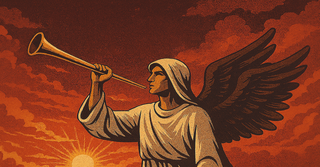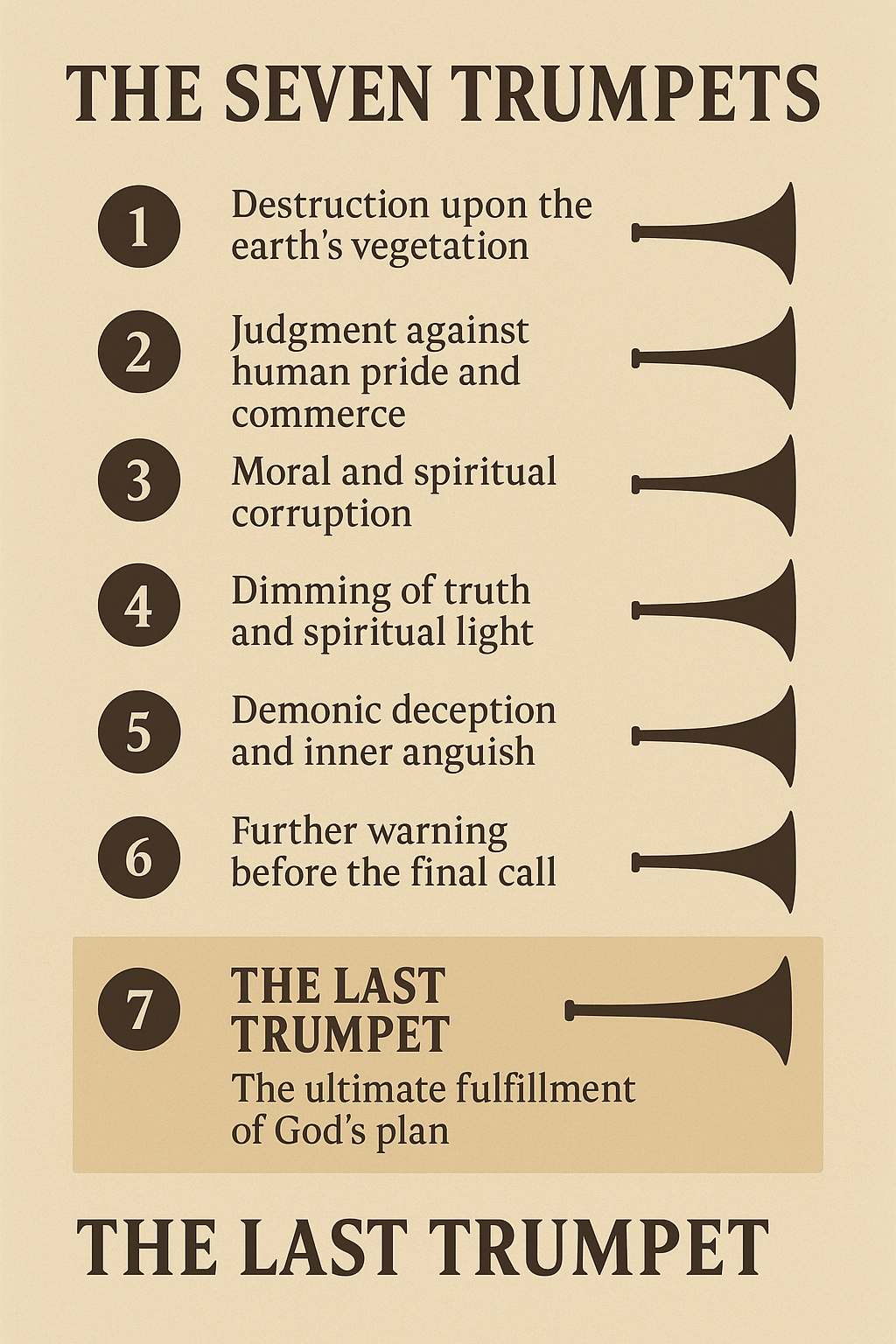What Is the Last Trumpet in the Bible?
Share

As the word “last” suggests, the “last trumpet” refers to a final sounding that will occur in the end times, as we read in the Book of Revelation. Its number and order are significant because several trumpets are blown before this climactic one. Each trumpet marks a stage of God’s judgment and divine intervention leading up to the culmination of history.
Since much of Revelation uses symbolic language that can be difficult to understand in our world today, it helps to examine how trumpets are used throughout the rest of Scripture to understand what they represent.
The Significance of Trumpets in the Bible
Throughout the Bible, trumpets are used to signify God’s presence, power, and purpose. The first major mention of a trumpet occurs in Exodus 19:16, when God descends upon Mount Sinai with thunder, lightning, thick clouds, and “the sound of a very loud trumpet.” The sound grows louder as God speaks to Moses—announcing His arrival, magnificence, and holiness.
Centuries later, in the Book of Revelation, the apostle John hears “a loud voice like a trumpet” (Revelation 1:10–18) and turns to see the One who calls Himself “the First and the Last,” “the Living One.” Once again, the trumpet is associated with the voice and presence of God—this time it is Jesus Christ revealing Himself in glory.
In Israel’s history, God commanded the use of trumpets (often ram’s horns, or shofars) for specific purposes, which included:
- to gather the people
- as a signal for the people to move
- as a battle cry
Perhaps the most well-known example is the battle of Jericho, when God instructed Joshua to have the priests blow their trumpets as the people marched around the city. On the seventh day, after the seventh circuit and the trumpet blast, the walls fell, not by human strength, but by God’s power and timing (Joshua 6).
Trumpets, then, consistently represent divine summons, warning, victory, and the transition from one phase of God’s plan to the next. So, if we are to understand the significance of the last trumpet, we need some background on what preceded the last and seventh trumpet in Revelation.
What Precedes the Last Trumpet in the Bible?
Before this final blast, six trumpets sound in succession in the Book of Revelation (chapters 8–9). Each one is played by a heavenly being, with the trumpet announcing a specific judgment that serves as a wake-up call to the world.
- The first trumpet brings hail and fire mixed with blood, signifying destruction upon the earth’s vegetation.
- The second trumpet turns a third of the sea into blood, showing divine judgment against human pride and commerce that corrupts creation.
- The third trumpet causes a great star, called Wormwood, to fall from heaven, turning waters bitter and symbolizing moral and spiritual corruption.
- The fourth trumpet darkens the sun, moon, and stars, portraying the dimming of truth and the loss of spiritual light.
- The fifth trumpet releases tormenting forces from the abyss, a picture of demonic deception and inner anguish upon those without God’s seal.
- The sixth trumpet unleashes four angels at the Euphrates, leading to massive destruction and further warning before the final call. Together, these six trumpets form a pattern of divine mercy and justice—progressively calling humanity to repentance before the ultimate fulfillment of God’s plan signaled by the seventh trumpet.

Where Does the Bible Mention the Last Trumpet?
“Then the seventh angel blew his trumpet, and there were loud voices in heaven, saying, ‘The kingdom of the world has become the kingdom of our Lord and of his Christ, and he shall reign forever and ever’” (Revelation 11:15).
The rest of the chapter continues with words that inspire believers: “...the twenty-four elders, who were seated on their thrones before God, fell on their faces and worshiped God, saying, ‘We give thanks to you, Lord God Almighty, the One who is and who was, because you have taken your great power and have begun to reign.’”
According to John Gill’s Exposition of the Bible, this verse is a declaration “that the kingdoms of the world are become Christ's, and that he shall reign for ever and ever.” The King of Kings and Lord of Lords will reign over all for eternity. Though He has always possessed this power, in those last days the world will finally recognize His rightful rule and the fulfillment of His eternal kingdom.
Is the Last Trumpet in Revelation the Same One Paul Mentions?
This is a question that is much debated by Bible readers and scholars since the Revelation passage and the verses in Paul’s first letter to the Corinthians both use the term “last trumpet.” But the actions surrounding the last trumpet are different in the two passages.
In 1 Corinthians 15:51-52, Paul writes, “Listen, I tell you a mystery: We will not all sleep, but we will all be changed—in a flash, in the twinkling of an eye, at the last trumpet. For the trumpet will sound, the dead will be raised imperishable, and we will be changed.” That is very different from the words in Revelation that talk about Jesus’ rule over all nations.
Does this mean that Paul is speaking more of a rapture experience at the sound of the last trumpet (something that will happen between heaven and earth), and that John in Revelation was detailing what is happening in heaven? While they may be two different sets of “activities,” could the implication be that they are concurrent events?
The Enduring Word Commentary makes three points about this question of whether these are the same trumpets/trumpeteers:
The last trumpet that Paul writes about may just be the last trumpet that believers hear on earth.
A distinction can be made between the trumpet of an angel and the trumpet of God. It is argued that the grammar Paul uses would be different if he were referring to the trumpet in Revelation 11.
Interestingly, one commentator says that the “last trumpet” was a figure of speech that originated with the Roman military when they broke camp. The last trumpet meant to start marching. So Paul could have been referring to a Christian’s “marching orders” as the Church is raptured.
Again, it would seem that if Paul was writing about the “last trumpet,” it would have had to be a term that his audience understood. They likely would have understood the Roman military term–certainly more so than the last trumpet in the Book of Revelation, which hadn’t been written yet.
Why This Matters for Believers Today
Both the last trumpet in Revelation 11:15 and the last trumpet in 1 Corinthians 15:51–52 carry powerful meaning for believers today. The trumpet in Revelation marks the final victory of Christ and the moment when the kingdoms of this world become the kingdom of God, and His reign is fully revealed. It reminds Christians that all suffering, corruption, and evil will one day end under the sovereign rule of Jesus Christ.This is the King of Kings that the people of Jerusalem welcomed on Palm Sunday, finally seen and understood by all.
The trumpet Paul describes in Corinthians, meanwhile, proclaims the moment of resurrection and transformation, when believers will be changed “in a moment, in the twinkling of an eye.” This gives Christians hope for personal redemption and eternal life. Together, these trumpet calls assure believers that both the world’s story and their own are moving toward restoration, victory, and everlasting life in Christ, a truth that strengthens our “walk by faith,” and our perseverance in the trials we endure until the day of Jesus.
Image created using AI technology and subsequently edited and reviewed by our editorial team.
Mary Oelerich-Meyer is a Chicago-area freelance writer and copy editor who prayed for years for a way to write about and for the Lord. She spent 20 years writing for area healthcare organizations, interviewing doctors and clinical professionals and writing more than 1,500 articles in addition to marketing collateral materials. Important work, but not what she felt called to do. She is grateful for any opportunity to share the Lord in her writing and editing, believing that life is too short to write about anything else. Previously she served as Marketing Communications Director for a large healthcare system. She holds a B.A. in International Business and Marketing from Cornell College (the original Cornell!) When not researching or writing, she loves to spend time with her writer daughter, granddaughter, rescue doggie and husband (not always in that order).